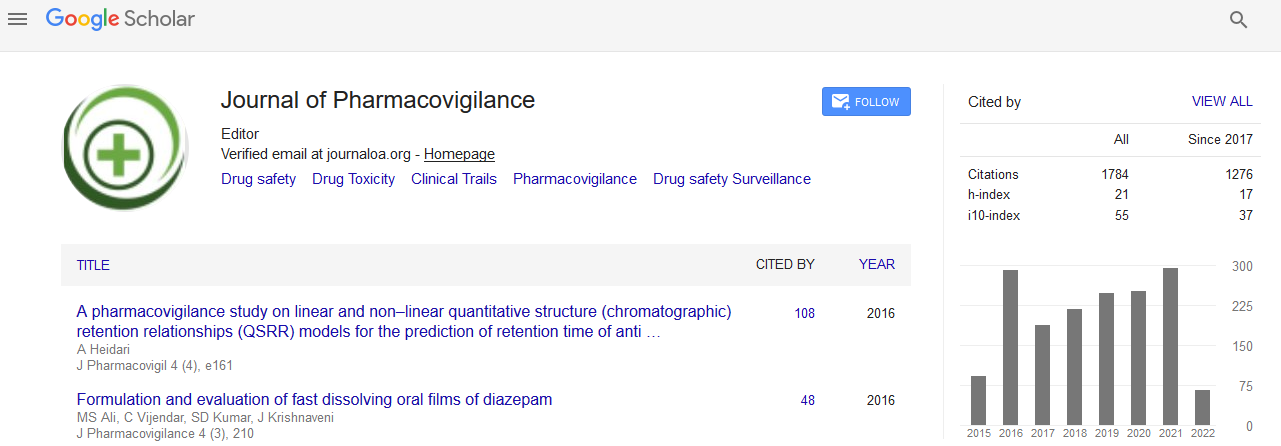Indexed In
- Open J Gate
- JournalTOCs
- The Global Impact Factor (GIF)
- RefSeek
- Hamdard University
- EBSCO A-Z
- OCLC- WorldCat
- Publons
- Euro Pub
- Google Scholar
Useful Links
Share This Page
Journal Flyer

Open Access Journals
- Agri and Aquaculture
- Biochemistry
- Bioinformatics & Systems Biology
- Business & Management
- Chemistry
- Clinical Sciences
- Engineering
- Food & Nutrition
- General Science
- Genetics & Molecular Biology
- Immunology & Microbiology
- Medical Sciences
- Neuroscience & Psychology
- Nursing & Health Care
- Pharmaceutical Sciences
Endothelial progenitor cell biology in Psoriatic Arthritis patients in the absence of traditional cardiovascular risk
3rd International Conference and Exhibition on Pharmacovigilance & Clinical Trials
October 27-29, 2014 Hyderabad International Convention Centre, India
Inderjeet Verma, Ashit Syngle and Pawan Krishan
Posters: J Pharmacovigilance
Abstract:
Background: Endothelial progenitor cells (EPCs) restore dysfunctional endothelium and protect against atherosclerotic vascular disease. Previously EPC population has been assessed in a heterogeneous population of with equivocal results in psoriatic arthritis (PsA) patients with confounding factors. The aim of this study was to investigate EPC population in PsA patients in the absence of traditional cardiovascular risk. Methods: Twenty two patients with PsA according to Classification Criteria for PsA criteria and twenty age- and sexmatched controls were included. Patients with risk factors for cardiovascular disease were excluded. EPCs (CD34+/CD133+) were assessed by Flow Cytometry. Endothelial function was assessed by measuring endothelial-dependent flow-mediated vasodilatation (FMD %) and carotid intima-media thickness (CIMT) was assessed by ultrasonography. Inflammatory markers i.e. erythrocyte sedimentation rate (ESR), C-reactive protein (CRP), tissue necrosis factor (TNF)-α, interleukin (IL)-6, IL-1 were also assessed in all subjects. Results: There was a significant impairment of EPC% in PsA patients as compared to controls (mean 0.028% vs. 0.047%, P<0.001). Endothelial function (FMD) and inflammatory markers were also significantly (P<0.05) altered as compared to healthy controls, but there was no significant difference in CIMT (mean 0.65 vs. 0.56, P=0.06). Specifically, CD34+CD133+cells were positively correlated with FMD (r=-0.62, p=0.004) and negatively correlated with CRP (r=-0.63, p=0.003), TNF-α (r=- 0.58, p=0.008), IL-6 (r=-0.64, p=0.003), disease activity (Disease Activity Score using 28 joints (r=-0.61, p=0.003) and disease activity index for psoriatic arthritis (r=-0.50, p=0.02). Conclusion: There is depleted EPC population in PsA patients in the absence of traditional cardiovascular risk. Inflammation plays a key role in EPC depletion and the later endothelial dysfunction in PsA patients.
Biography :
Inderjeet Verma after B.Pharm had completed M.Pharmacy in pharmacy practice in 2008 and currently he is a doctoral research fellow in Department of Pharmaceutical Sciences and Drug Research, Punjabi University, Patiala. He has published more than 9 national and international publications in reputed journals and 18 national (IRACON) and international (EULAR, APLAR and ACR) conference proceedings. Last year he was invited for oral presentation on ?Impact of DMARDs on Autonomic Neuropathy in RA and AS patients? at ACCP 2013, Haiphong, Vietnam. Presently he is working on autonomic neuropathy, stem cells and effective therapy in rheumatic patients.


